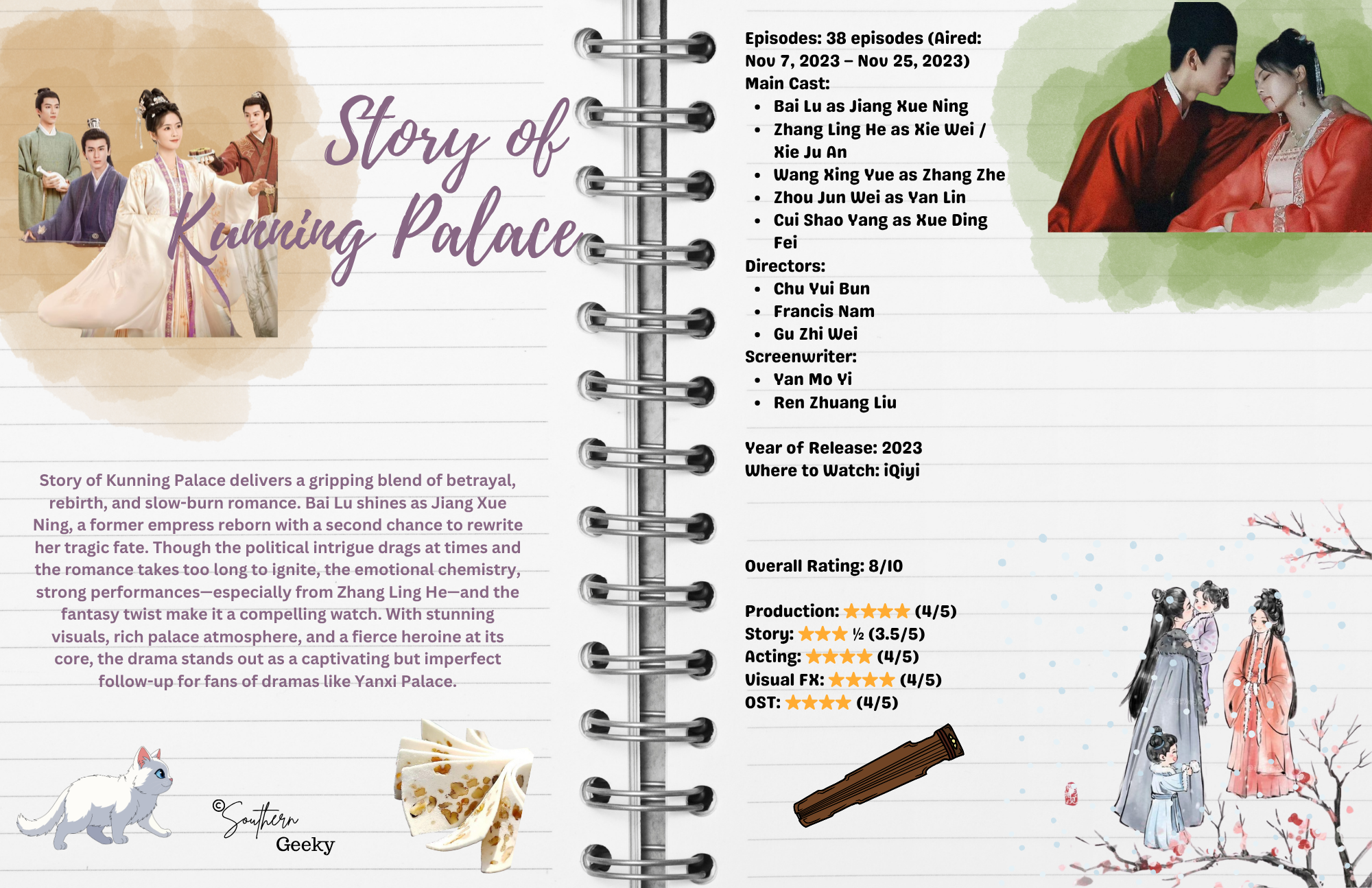“The Story of Kunning Palace” C-Drama Review: Betrayal, Rebirth, and an Unforgettable Slow-Burn Romance
What if the woman who destroyed an empire was given one more chance to save it?
Story of Kunning Palace is a sweeping historical-fantasy epic that blends betrayal, rebirth, and slow-burn romance into one of the most emotionally charged Chinese dramas of its year. Starring Bai Lu as Jiang Xue Ning, Zhang Ling He as Xie Wei, and Wang Xing Yue as Zhang Zhe, the series plunges viewers into a palace world shaped by ambition, regret, and destiny. As Jiang Xue Ning is reborn with the chance to rewrite her tragic past, the story unfolds into a fierce battle between power and redemption, shadowed by political schemes and unresolved love. With its elegant production design, gripping performances, and atmospheric storytelling, Story of Kunning Palace stands as a visually striking and deeply compelling tale of resilience, revenge, and relentless devotion.
Story and Themes
Story of Kunning Palace blends palace intrigue, second-chance fantasy, and a sweeping but slow-burn romance. The drama follows Jiang Xue Ning, a woman whose ruthless rise to the throne leads to devastating consequences—but who is mysteriously reborn as her younger self with a chance to rewrite her fate. This “rebirth” twist gives the drama a light fantasy layer, separating it from the grounded historical realism of Story of Yanxi Palace.
Thematically, the drama explores regret, redemption, ambition, trauma, and the heavy price of political power. At its core, it’s a story about a woman trying to right her past wrongs while navigating complicated loyalties and an emotionally intense relationship with Xie Wei, a man tied to both her downfall and her salvation.
Similarities with Yanxi Palace include a fierce heroine, palace politics, scheming ministers, strong friendships, and a love triangle featuring a jealous, aloof ML and a loyal, pitiful 2nd ML.
But unlike Yanxi Palace, which builds romance slowly and subtly, Kunning Palace leans into a more dramatic, emotionally charged love story that revolves around fate and rebirth.
Performances
Bai Lu shines—again. She fully delivers both versions of Jiang Xue Ning: the power-hungry empress and the reborn noblewoman who’s stubborn yet deeply caring. Her emotional range anchored the series and gave it real weight.
Zhang Ling He was the biggest surprise. His portrayal of Xie Wei is commanding, unsettling, protective, and incredibly layered. He matched Bai Lu’s intensity and gave the drama its raw emotional tension.
Wang Xing Yue as the second male lead was solid but didn’t spark second-lead syndrome. His restrained approach suited the character but sometimes felt too muted.
Unexpectedly, Cui Shao Yang (Xue Ding Fei) delivered some of the most heartfelt growth in the entire series, showing more genuine emotional evolution than the official 2ML.
Direction and Production
Visually, the drama is polished with refined palace sets, strong costume design, and clean camera work. The direction balances emotional scenes with heavy political sequences, though the pacing noticeably drags during repeated political conflicts. The time-reversal fantasy elements are integrated smoothly without overwhelming the story.
The overall tone is emotionally dramatic but often broken up by sharp humor and witty banter that keeps the show light enough to enjoy.
Strengths
Powerful Female Lead: Bai Lu delivers a fierce, intelligent, and emotionally layered Jiang Xue Ning.
Cinematic Visuals: Elegant palace sets, rich costuming, and atmospheric lighting elevate every scene.
Emotional Slow-Burn Romance: The tension between Jiang Xue Ning and Xie Wei grows into a gripping, fate-driven love story.
Standout Performances: Zhang Ling He surprises with depth and intensity, while the supporting cast brings nuance and heart.
Weaknesses
Drawn-Out Political Arcs: Court intrigue repeats the same conflicts, causing pacing dips.
Delayed Romance Progression: Despite strong early chemistry, the main relationship takes too long to fully develop.
Understated Second Lead: Zhang Zhe’s arc lacks emotional punch, making the love triangle feel uneven.
Inconsistent Character Momentum: Some side characters show more growth than major ones, creating imbalance in the narrative.
Final Thoughts
Story of Kunning Palace is a polished, emotional, and beautifully acted rebirth drama that stands strong on its own—but when compared to Yanxi Palace, it doesn’t surpass it in political depth or narrative tightness. Still, Bai Lu and Zhang Ling He deliver performances worth watching, and the fantasy twist adds a refreshing dimension to the typical palace drama formula.
Overall, it’s a strong recommendation for viewers who enjoy palace intrigue mixed with intense, fate-driven romance.
Rating: 8/10
Where to Watch: iQiyi

